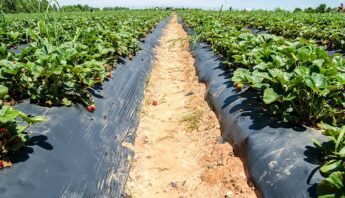As kids head back to school, DPR director attempts to downplay risks of fumigant pesticide 1,3-D (Telone)
FOR IMMEDIATE RELEASE
August 24, 2015
Press contact:
Paul Towers, PAN, (916) 216-1082, ptowers@panna.org
Sacramento, CA – Late Friday, state officials responded — and again signaled delay — on implementing restrictions for the use of the cancer-causing pesticide Telone. This comes on the heals of repeated requests to end the practice of “banking” allowances for hazardous pesticide use from year-to-year. And across the state, children are returning to school, some of them in very close proximity to fields where heavy amounts of the Telone are used.
“California officials are treating cancer-causing pesticides like cell phone minutes. Despite clear evidence that they exceed state-mandated safety levels, they have allowed growers to bank or roll-over Telone use from year-to-year. DPR and CalEPA must close this loophole,” said Sarah Aird, acting executive director of Californians for Pesticide Reform.
Starting in 2002, then director of the California Department of Pesticide Regulation (DPR) Paul Helliker worked with manufacturer Dow Chemical Co. to create a plan that allowed for widespread use of 1,3-dichloropropene (trade name: Telone), despite concerns about the chemical from scientists inside the department. The plan allowed Dow to work directly with growers to monitor use up to 90,250-pound mandated safety caps. Notably, it also allowed growers to “bank” or roll-over use allowances of the known carcinogen from year-to-year. And if growers used more than twice the safety cap in any region, or 180,500 pounds, they were allowed to apply for and receive approval to use more. The latter was commonly called “exceedences,” a practice that many scientists and community members call into question.
“These unscientific and unsafe practices have put California children, especially Latinos, in harm’s way,” said Francisco Rodriguez, president of the Pajaro Valley Federation of Teachers.
Banking grower use, and allowing exeedences, first came to light publicly after the Center for Investigative Reporting began submitting detailed public records requests to the department in 2013. In February 2014, DPR Director Brian Leahy issued a memorandum to end the practice of granting exceedances, or use of Telone at levels more than double what the state considers safe. But the department continued to allow the practice of banking, and on Friday affirmed its continuation until at least next year.
“Dow Chemical Co. and state regulators hatched a plan behind closed doors and only began to fix it when they got caught,” said Aird.
And that cozy relationship is clear. In an article published over the weekend in the Ventura County Star, investigative journalists quote DPR director Brian Leahy as telling Ventura County Supervisors that “the department never violated its own system because [Telone] waivers were part of that system.”
The article went further to point out the conflicting information from the department. According to the article, despite conflicting evidence from state toxicologists about pesticides impacting schoolchildren, director Leahy told supervisors “the kids weren’t at risk here.”
1,3-D is a gaseous fumigant pesticide, which is highly volatile and likely to drift from point of application. It is used widely across the state in growing strawberries, nuts, grapes, carrots and sweet potatoes. In its 2014 report, the California Department of Public Health found the pesticide to be the second most frequently used in close proximity of public schools.
“It took a memo to start the practice. A memo to fix part of the mistake. And now officials are unwilling to write one more to rectify the problem,” said Paul Towers, spokesperson for Pesticide Action Network. “It’s unfair and unjust, and California communities, especially children, deserve better. With a stroke of a pen, the Department of Pesticide Regulation could end the practice of banking cancer-causing pesticides. Kids deserve this protection now.”







